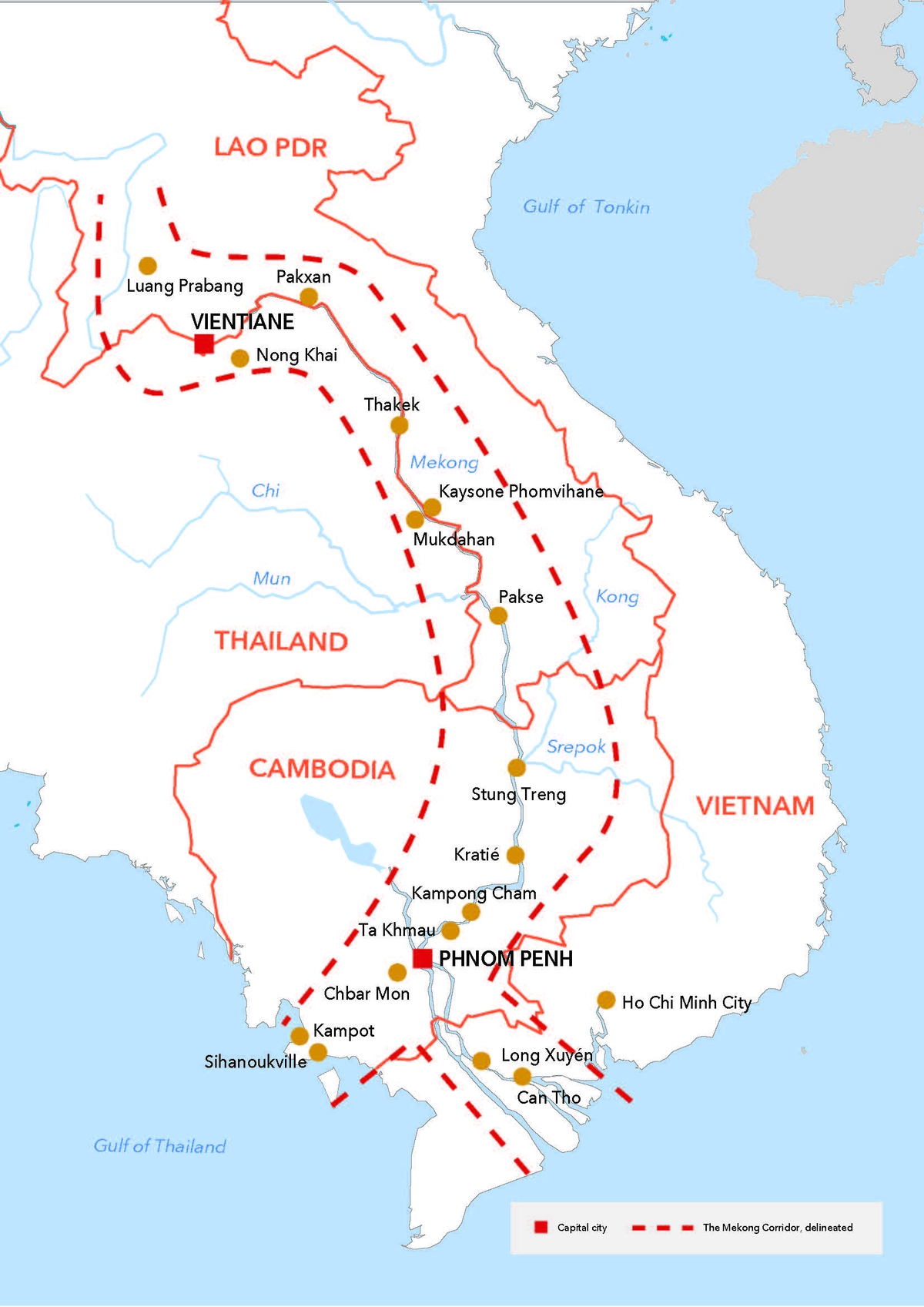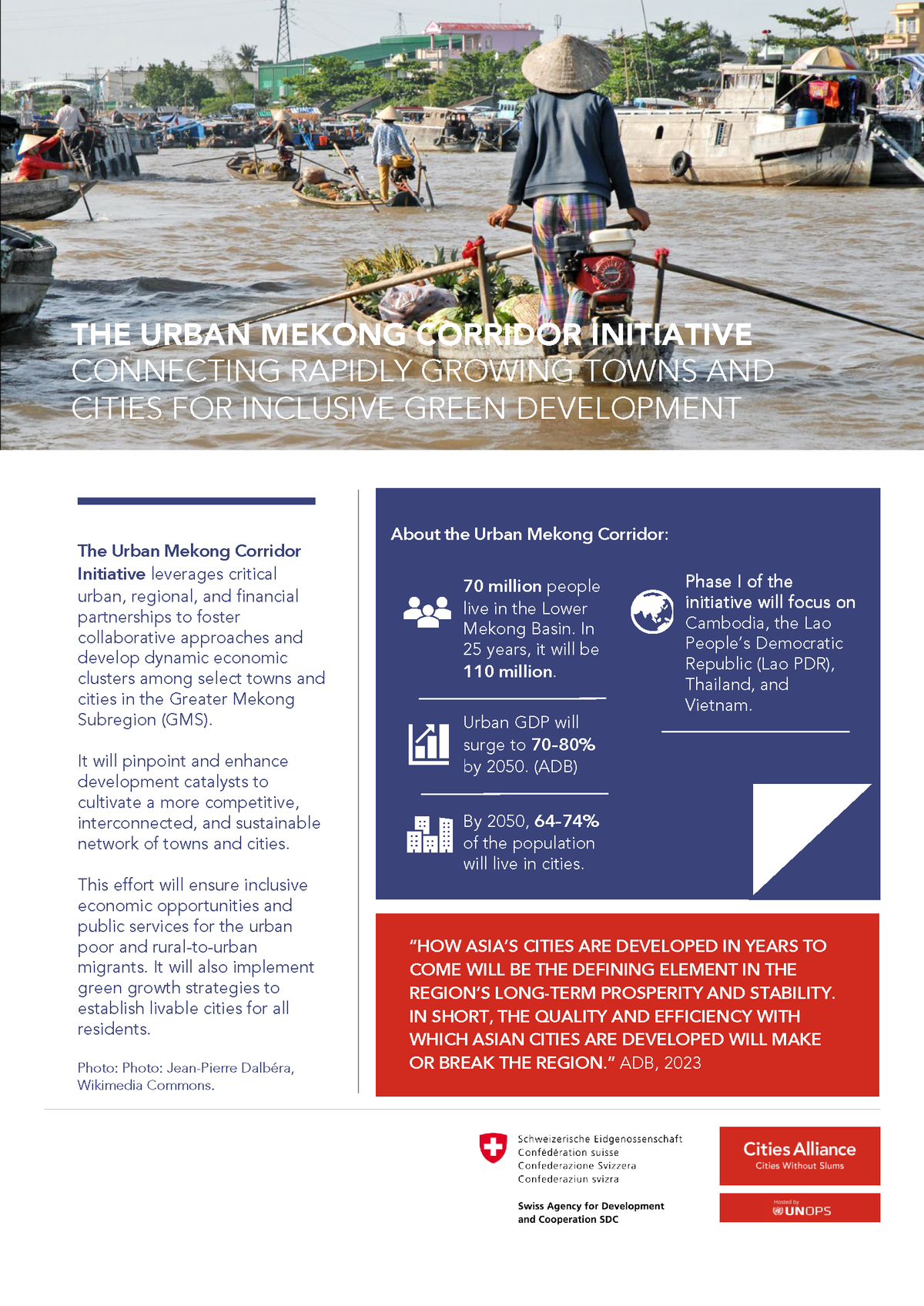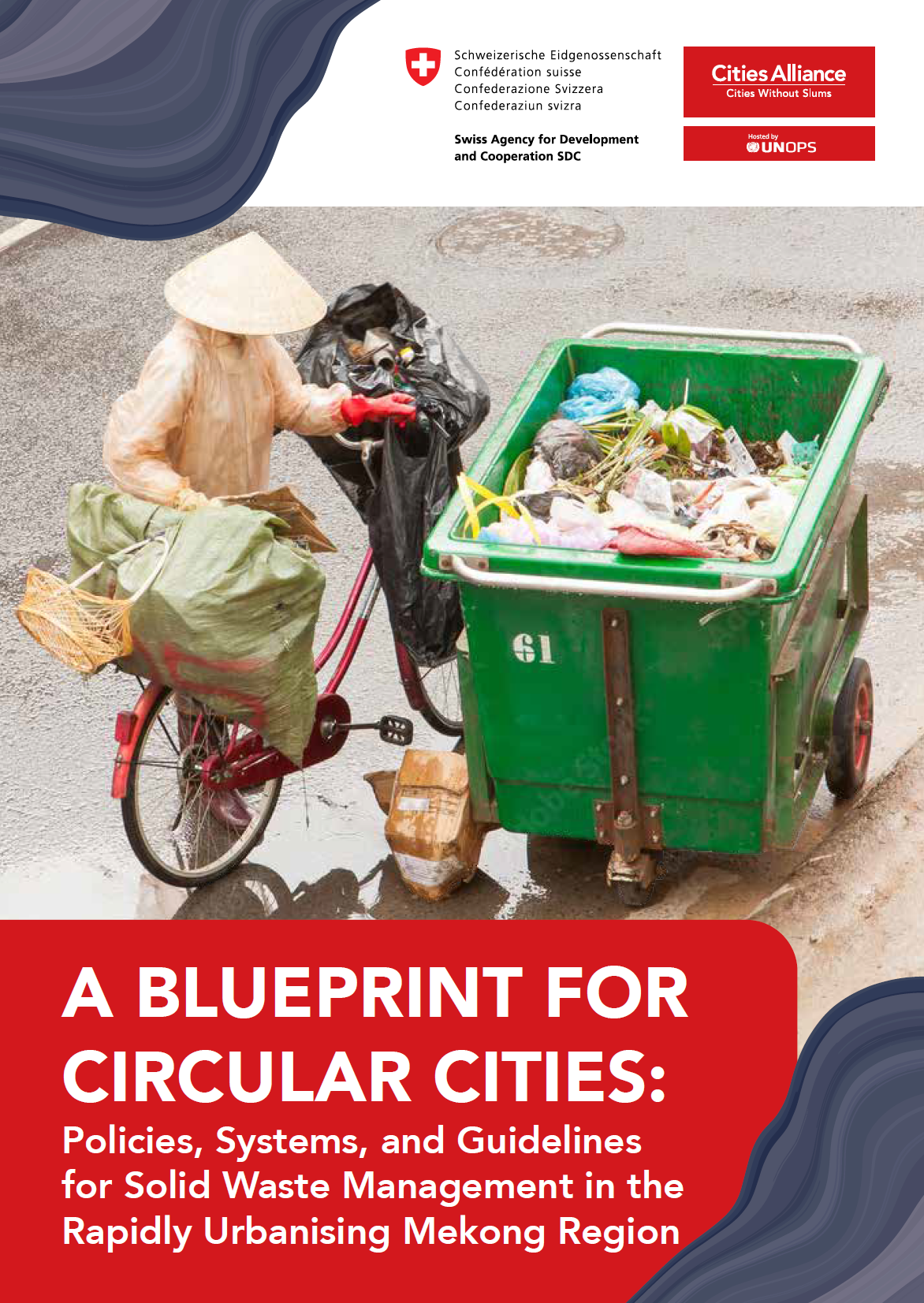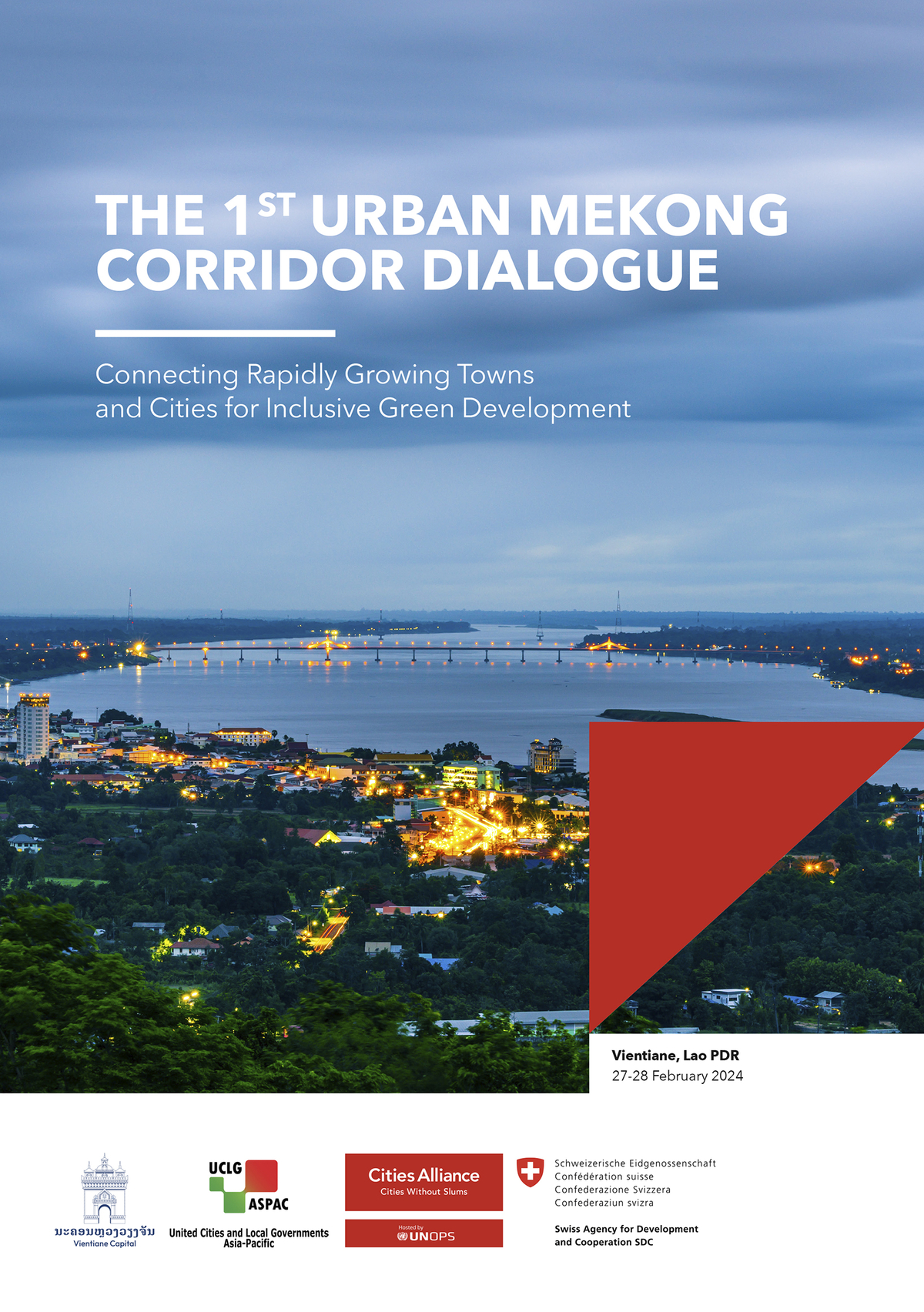The Greater Mekong Subregion (GMS) is a naturally interconnected economic region that is woven together by the Mekong River, one of the longest transboundary rivers in Asia. It has six member countries: Cambodia, China, the Lao People's Democratic Republic (PDR), Myanmar, Thailand, and Vietnam.
While the GMS remains one of the least urbanised areas in the world, the number of people migrating to cities is rising rapidly, with an urbanisation growth rate exceeding the global average.
Urbanisation is producing substantial economic advantages for the region. Cities and towns are evolving into drivers of economic growth and hubs of culture and innovation. Most of the employment growth is also happening in towns and cities, underscoring the increasingly pivotal role urban centres will play in national economic development over the next two decades.
Much of this economic growth, however, is unevenly distributed. Towns and regions with inadequate infrastructure and limited investment persistently experience high poverty rates, slow growth, and substantial out-migration to larger cities and neighbouring nations. Informal employment and housing are prevalent, with limited access to public services – a situation that increases residents’ vulnerability to exploitation and displacement.
The Urban Mekong Corridor Initiative will provide comprehensive planning for economic and social equity as well as environmental sustainability. It will leverage critical urban, regional, and financial partnerships to foster collaborative approaches, develop dynamic economic clusters among select towns and cities in the subregion, and both pinpoint and enhance development catalysts to cultivate a more competitive, interconnected, and sustainable network of towns and cities.
It includes the Urban Mekong Corridor Dialogue, a pioneering programme that focuses on connecting the region’s rapidly growing towns and cities for inclusive green development.
The initiative is part of the Global Resilient Systems of Secondary Cities and Migration Dynamics programme supported by the Swiss Agency for Development and Cooperation (SDC) from 2018–2026.
“HOW ASIA’S CITIES ARE DEVELOPED IN YEARS TO COME WILL BE THE DEFINING ELEMENT IN THE REGION’S LONG-TERM PROSPERITY AND STABILITY. IN SHORT, THE QUALITY AND EFFICIENCY WITH WHICH ASIAN CITIES ARE DEVELOPED WILL MAKE OR BREAK THE REGION.” ADB, 2023
About the Urban Mekong Corridor

70 million people live in the Lower Mekong Basin. In 25 years, it will be 110 million.

Urban GDP will surge to 70–80% by 2050. (ADB)

By 2050, 64–74% of the population will live in cities.

Phase I of the initiative will focus on Cambodia, the Lao PDR, Thailand, and Vietnam.
Approach
The initiative’s collaborative approach fosters robust regional partnerships among public, private, and civil entities to drive solutions tailored to the local context. Cities Alliance has spearheaded this approach for over 20 years across 88 countries and 176 cities, leveraging the collective expertise of its partnership to catalyse new urban thinking and solutions at the local and global levels.
It fortifies local systems, creating favourable conditions for all urban residents while reinforcing programme ownership and long-term sustainability. It also champions mentorship and forges twinning relationships with pioneering cities within the Association of Southeast Asian Nations (ASEAN) region – thus creating an environment for incubating, replicating, and accelerating effective approaches.
The ASEAN Mayors Forum, an accredited entity within ASEAN and hosted by UCLG ASPAC, will be a strategic platform for exchange and consultations.
This elevates the profile of leading inclusive and green cities across the ASEAN region, granting them greater visibility and exposure on regional and global platforms to highlight the pivotal role of cities as catalysts for innovation and solutions.
Components
This network will comprise government, business, and civil society stakeholders to promote connections among towns and cities along the corridor.
The goal is to create new urban clusters, harness economies of agglomeration, and encourage cross-border cooperation. This entails crafting strategic corridor plans for medium and long-term initiatives centred on job creation, public services, investments, and green growth.
These plans with selected towns and cities will foster partnership among urban stakeholders to:
- Enhance planning
- Share resources
- Boost corridor infrastructure capacity and services
- Exchange knowledge and information
- Undertake regulatory reform
- Shape policies more effectively
Approaches can address a range of areas, such as land-use planning, housing and addressing informal settlements, public services, renewable energy, waste management, infrastructure, and skills development. They can also include promising economic frameworks for job generation, tourism, community and environmental services, and digitalisation.
Connect Investors to the local level by creating funding models and establishing connections with international development partners, financing institutions, and private sector focused on supporting local city initiatives.
Focus Areas
This regional initiative takes a proactive approach to meeting the pressing need for city-level actions and commitments to promote inclusive green growth within four key areas, with a dedicated emphasis on gender considerations. The approach has been tested in various city initiatives implemented by Cities Alliance.

Planning
Natural urban population growth and rural-urban migration is leading to rapid increases in the populations of towns and cities, causing massive urban expansion. Local urban development planning offers a cost-effective way for cities to change the trajectory of their rapid growth toward inclusivity and environmental sustainability.

Jobs
Taking proactive measures to create employment and work opportunities for both the current urban poor and rural-urban migrants, as well as implementing future-ready strategies for those expected to migrate to urban areas in the coming decades. These opportunities need to be designed to be inclusive for men, women, and youth.

Services
Sustainable and inclusive public services that prioritise accommodating the expected urban growth by 2050, with a commitment to ensuring equal access and benefits for all residents, regardless of their origin and gender.

Environment
Environmental Stewardship and Climate Resilience. Implementing resolute measures to combat environmental degradation and mitigate the negative effects of climate change by promoting circular economic growth and environmentally friendly urban development.
The Urban Mekong Corridor Dialogue
The Urban Mekong Corridor Dialogue is a pioneering programme under the Urban Mekong Corridor Initiative that focuses on connecting the region’s rapidly growing towns and cities for inclusive green development. It embodies a collective effort to address the multifaceted challenges of rapid urbanisation, environmental sustainability, and social equity across the region.
Partners






